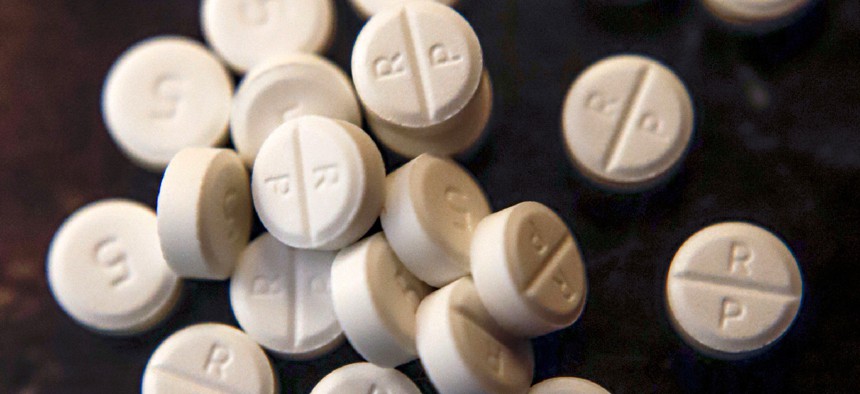Texas AG Brokers Deal With Counties on Opioid Payouts

This June 17, 2019, file photo shows 5-mg pills of Oxycodone. AP Photo/Keith Srakocic

Connecting state and local government leaders
The deal would send 15% of any national settlement deal directly to cities and counties.
The Texas Attorney General reached an agreement this week with a group of counties that will lay out how money from a national opioid settlement will be paid out to local governments.
Lawyers involved in the negotiation said the agreement could be a model for other states looking to work out deals to disperse money meant to help governments respond to the ongoing opioid crisis before a national settlement is finalized.
Texas is expected to receive approximately $1.5 billion through the national settlement. Under the agreement, 15% of the settlement would be distributed directly to cities and counties, another 15% would go to the state and be administered by the legislature, and the remaining 70% would go to the newly created Texas Opioid Council, which would distribute the money to regional health care partnerships for treatment programs.
Thousands of local governments across the United States have filed lawsuits against drug distributors, manufacturers and pharmacies, alleging the companies aggressively marketed and sold prescription opioids in a manner that led to addiction and overdose deaths in their communities. Many of the lawsuits have been consolidated into litigation overseen by a federal judge in Ohio, who has been actively working to broker a comprehensive settlement agreement. But local and state government leaders have clashed over the best way to structure any financial agreement.
The latest national deal under negotiation would require three drug distributors to pay out $19.2 billion over 18 years. As of March, 31 states had tentatively agreed to the deal, the New York Times reported.
Texas Attorney General Ken Paxton said his state’s bipartisan agreement would ensure that local governments receive “desperately needed funding for education, prevention, and treatment in our fight against opioid abuse.”
The direct payouts to municipalities and counties under the expected deal vary widely—from $4 for the town of Toco, with a population of under 100 people, to nearly $15 million for Harris County. Officials from several counties spoke favorably of the deal.
“This agreement is a united way in which state and county leaders may guarantee that fewer and fewer Texas families will ever have to experience the grips of addiction and the sorrows of death associated with opioids abuse,” said Keith Schroeder, county judge for Burleson County, which would receive a direct payment of about $70,000.
But Bexar County Judge Nelson Wolff said the $7 million his county is expected to receive is “nothing” compared to the damage caused by the opioid crisis.
The Texas agreement could “become a model for other states to use across the United States,” attorney Mikal Watts, whose firm represented 13 Texas counties, told KSAT-TV.
Other attorneys involved in the case said a state deal was essential before moving forward with the national settlement.
"It is critically important that a structure is in place before a settlement is approved to make sure that funds reach these communities to provide critical relief on the ground,” said attorney Matthew McCarley, whose firm represented numerous cities, counties and local governments.
Andrea Noble is a staff correspondent with Route Fifty.

NEXT STORY: Coronavirus Will Have an Unequal Impact on School Budgets




